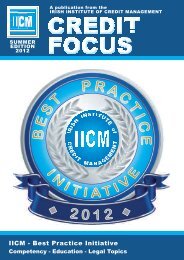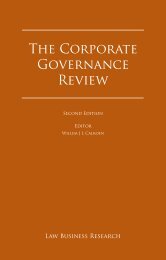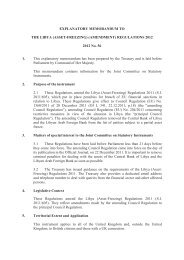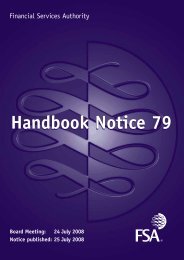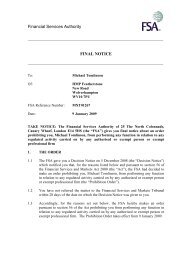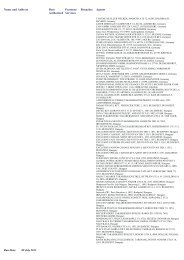FSA Annual Report 2006/07 - Better Regulation Ltd
FSA Annual Report 2006/07 - Better Regulation Ltd
FSA Annual Report 2006/07 - Better Regulation Ltd
You also want an ePaper? Increase the reach of your titles
YUMPU automatically turns print PDFs into web optimized ePapers that Google loves.
Section six – Appendices<br />
Appendix 2<br />
1<strong>07</strong><br />
We have demonstrated, through the significant simplification of our conduct<br />
of business rules and our recent decision on the Menu, our commitment to<br />
move away from detailed, prescriptive rules. This will give firms greater<br />
flexibility in meeting our regulatory standards. However, as we have<br />
highlighted in our <strong>Annual</strong> <strong>Report</strong>, we continue to find too many instances of<br />
retail firms not treating their customers fairly. While this remains the case,<br />
regulatory intervention will continue to be necessary.<br />
Financial Services Compensation Scheme (FSCS)<br />
In March 20<strong>07</strong> we published a Consultation Paper (CP<strong>07</strong>/5) proposing new<br />
funding arrangements for the FSCS. Finding a solution has been difficult;<br />
unsurprisingly, it has not been possible to devise funding arrangements which<br />
have universal support from the industry. However, there was general<br />
acceptance that the present arrangements were no longer fit for purpose. We<br />
believe that the model we have proposed is more rational, fairer to the<br />
various players in the market and more robust. It will also put the FSCS in a<br />
better position to provide an enhanced level of compensation for<br />
unforeseeable events.<br />
We do not expect our proposals to affect capital requirements or credit<br />
ratings for general insurers (or indeed for other firms). Although the<br />
proposals would raise potential exposure levels for general insurers (because<br />
of the revised sub-class thresholds and potential exposure to the defaults of<br />
other sectors), we do not consider there to be any change in the existing<br />
practice for the recording of such potential exposure, either under accounting<br />
practices or our own capital requirement regime. Unless a liability to the<br />
FSCS is at least ‘more likely than not’ and can be measured reliably, we<br />
would not expect it to appear as an accounting liability or affect a firm’s<br />
capital requirements under our rules. It would be reasonable to apply the<br />
same logic to credit ratings.<br />
We also announced our intention to consult separately on a final level of<br />
compensation funding to be made available based on wholesale business,<br />
which would involve firms which are not currently required to contribute to<br />
FSCS compensation payments. We explained our position on this issue to the<br />
Panel before publishing CP<strong>07</strong>/5. Wholesale and retail markets are not wholly<br />
insulated from each other. In our judgement it is reasonable to consider that<br />
a major default in the retail market could have a knock-on effect on the<br />
stability and profitability of the wholesale market. The retail and wholesale<br />
sectors often stand as counterparties to each other, interacting in mutually<br />
beneficial business relationships. Wholesale institutions therefore have a real<br />
interest in maintaining confidence and stability in the retail market.<br />
The proposed model also offers considerable benefits for some firms that<br />
have both wholesale and retail business. The focus of the proposed model on<br />
eligible income means that much of the business of such firms would be<br />
excluded from the relevant sub-classes, reducing their potential exposure at<br />
this level compared to the current model.<br />
We will take into account the issues raised by the Panel in developing our<br />
thinking on this further. We agree that there are practical issues relating to<br />
the design of any wholesale pool; for example in our current consultation we<br />
have sought stakeholder feedback on appropriate tariff measures for a<br />
wholesale pool. The fact that we have taken the decision to consult<br />
separately reflects the difficulty of this issue and the seriousness with which<br />
we are considering concerns that have been expressed.



